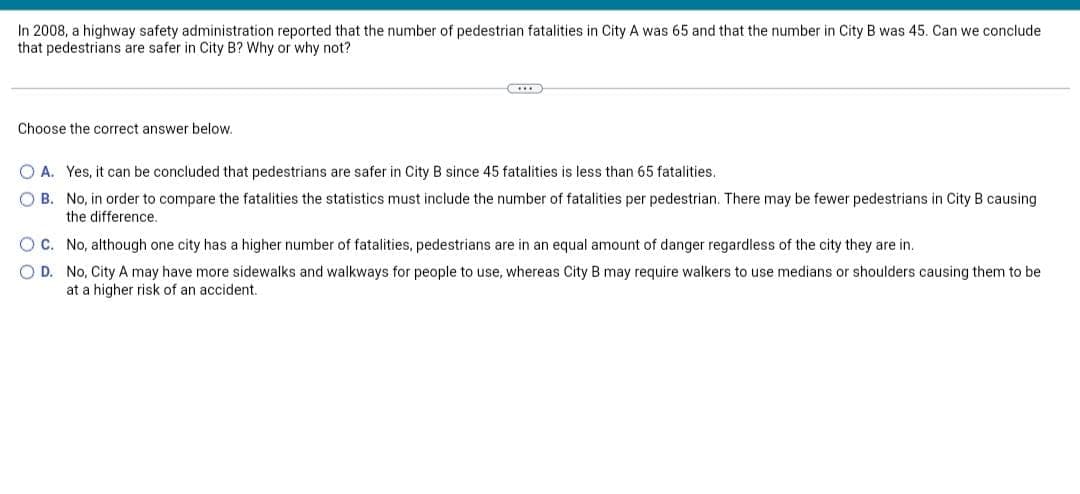In 2008, a highway safety administration reported that the number of pedestrian fatalities in City A was 65 and that the number in City B was 45. Can we conclude that pedestrians are safer in City B? Why or why not? Choose the correct answer below. O A. Yes, it can be concluded that pedestrians are safer in City B since 45 fatalities is less than 65 fatalities. OB. No, in order to compare the fatalities the statistics must include the number of fatalities per pedestrian. There may be fewer pedestrians in City B causing the difference. OC. No, although one city has a higher number of fatalities, pedestrians are in an equal amount of danger regardless of the city they are in. OD. No, City A may have more sidewalks and walkways for people to use, whereas City B may require walkers to use medians or shoulders causing them to be at a higher risk of an accident.
In 2008, a highway safety administration reported that the number of pedestrian fatalities in City A was 65 and that the number in City B was 45. Can we conclude that pedestrians are safer in City B? Why or why not? Choose the correct answer below. O A. Yes, it can be concluded that pedestrians are safer in City B since 45 fatalities is less than 65 fatalities. OB. No, in order to compare the fatalities the statistics must include the number of fatalities per pedestrian. There may be fewer pedestrians in City B causing the difference. OC. No, although one city has a higher number of fatalities, pedestrians are in an equal amount of danger regardless of the city they are in. OD. No, City A may have more sidewalks and walkways for people to use, whereas City B may require walkers to use medians or shoulders causing them to be at a higher risk of an accident.
Glencoe Algebra 1, Student Edition, 9780079039897, 0079039898, 2018
18th Edition
ISBN:9780079039897
Author:Carter
Publisher:Carter
Chapter10: Statistics
Section10.5: Comparing Sets Of Data
Problem 26PFA
Related questions
Question
Q18 Needed to be solved this multiple choice question correctly in 30 minutes and get the thumbs up please provide correct option

Transcribed Image Text:In 2008, a highway safety administration reported that the number of pedestrian fatalities in City A was 65 and that the number in City B was 45. Can we conclude
that pedestrians are safer in City B? Why or why not?
II
Choose the correct answer below.
O A. Yes, it can be concluded that pedestrians are safer in City B since 45 fatalities is less than 65 fatalities.
OB. No, in order to compare the fatalities the statistics must include the number of fatalities per pedestrian. There may be fewer pedestrians in City B causing
the difference.
OC. No, although one city has a higher number of fatalities, pedestrians are in an equal amount of danger regardless of the city they are in.
OD. No, City A may have more sidewalks and walkways for people to use, whereas City B may require walkers to use medians or shoulders causing them to be
at a higher risk of an accident.
Expert Solution
This question has been solved!
Explore an expertly crafted, step-by-step solution for a thorough understanding of key concepts.
Step by step
Solved in 2 steps with 2 images

Recommended textbooks for you

Glencoe Algebra 1, Student Edition, 9780079039897…
Algebra
ISBN:
9780079039897
Author:
Carter
Publisher:
McGraw Hill

Big Ideas Math A Bridge To Success Algebra 1: Stu…
Algebra
ISBN:
9781680331141
Author:
HOUGHTON MIFFLIN HARCOURT
Publisher:
Houghton Mifflin Harcourt

Glencoe Algebra 1, Student Edition, 9780079039897…
Algebra
ISBN:
9780079039897
Author:
Carter
Publisher:
McGraw Hill

Big Ideas Math A Bridge To Success Algebra 1: Stu…
Algebra
ISBN:
9781680331141
Author:
HOUGHTON MIFFLIN HARCOURT
Publisher:
Houghton Mifflin Harcourt